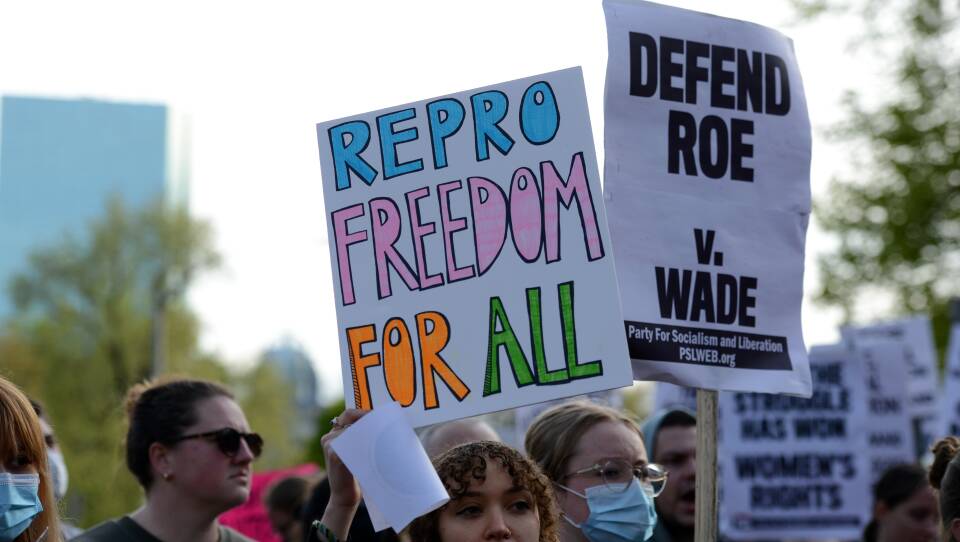Planned Parenthood League of Massachusetts has launched a new center with a focus on researching barriers to reproductive healthcare, and the impact they have on marginalized communities.
Organizers and advocates say such research is particularly essential as the nation prepares for major changes in access to reproductive health care, with the Supreme Court likely to strike down Roe v. Wade and eliminate the constitutional right to abortion. The ASPIRE (Advancing Science and Practice through Innovations in Research and Education) Center, which will work out of Planned Parenthood's four Massachusetts locations, will conduct research, train new practitioners and offer educational programs. The center was launched in a virtual event last week, with a more formal launch scheduled for the fall.
Dr. Alisa Goldberg, vice president of research at Planned Parenthood League of Massachusetts and founding director of the Division of Family Planning at Brigham Women’s Hospital, says the “catastrophic assault” on reproductive rights makes the center’s mission even more vital. She argues it’s crucial to understand systemic barriers faced by people of color, young LGBTQ people and disabled people.
“Abortion restrictions and regulations disproportionately impact people of color and marginalized people. They are the ones most likely to already face the most barriers,” she said. “We anticipate that patients in the future landscape are going to need to rely on a variety of networks to navigate — to get — care.”
Goldberg says the center will expand on research that can have real-world implications, such as a recent study on medication abortion and ectopic pregnancies — or pregnancies that are growing outside of the uterus and are dangerous, even deadly. Goldberg’s team found that it was safe and effective to prescribe abortion pills as soon as a patient sought an abortion rather than delaying to rule out an ectopic pregnancy.
The research could have practical implications in states like Texas, which have abortion bans early in pregnancy. “This type of research, which is clinically based research that has a potential to impact abortion access, is something that we have focused on for years and is critically important now as well,” Goldberg said.
Studies conducted by the new center could also have more local public policy implications. Goldberg pointed to a 2019 Massachusetts study that found the commonwealth’s parental consent law for minors led to delays in getting an abortion, and had a disproportionate impact on young people of color. The following year, the state Legislature passed the ROE Act, lowering the age to 16.
“It [the study] was one of the pieces of evidence that helped make the case for reducing the age for parental consent in Massachusetts,” Goldberg said.
In addition to research projects such as looking at young people having to travel to Massachusetts from other states for abortions if Roe v. Wade is overturned, Goldberg says the center plans to research the barriers faced by people who are disabled in accessing care — which she says has rarely been studied.
Advocates like Leslie Templeton, founder of the Disabled and Pro-Choice Coalition, a group of more than 60 nationwide disability advocates, say that the intentional inclusion of disability shows how reproductive health organizations are slowly becoming more intersectional in their support of marginalized communities.
“I thought it was great that right off the bat, disability was there and in the forefront of their minds with this program they're starting,” she said. “A lot of the time when you see reproductive orgs doing something like this, disability often is left out.”
Templeton says that more research is needed about the barriers faced by disabled people in accessing reproductive healthcare, including physical and financial barriers, as well as communication barriers for people who may be nonverbal or use sign language.
“I would love to see them [the new center] look at how — even a lot of reproductive centers tend to be inaccessible, very, very inaccessible, whether it's getting through the door, or the medical equipment there isn't accessible,” Templeton said.
She added there is a need for more research about parental rights and “reproductive freedom” for disabled people, too. The National Council on Disability has found parents with disabilities routinely face discrimination in child custody cases and are far more likely to lose their parental rights than nondisabled parents.
“Not only being able to access abortions, but also being able to have kids,” Templeton said. “I think that's a side that a lot of people forget is an issue for disabled people. ... A lot of disabled people get their kids taken away.”
At the recent Bans Off Our Bodies rally in Boston, she heard just one other speaker, Tanisha Sullivan of the NAACP, mention the disabled community in their remarks. But the new center, and a growing awareness about disability and reproductive freedom, could represent a turning point.
“If this was two years ago, four years ago, five years ago, I don't know if it would be included. There's been so much work done by the community,” Templeton said. “It's just nice to not have to fight to be included.”








